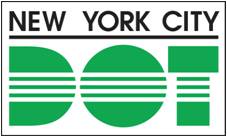Manhattan's Last Single Space Meter

As the crew from the Department of Transportation surrounded the street in front of meter No. 101-0655 with orange cones, the end of an era was drawing nearer.
A few minutes later DOT worker Dennis Weber pulled the mechanical innards out from the single-space meter on Frederick Douglass Boulevard between 125th and 126th streets. Next came the jackhammer as his partner Kemraj Bowani worked his way around the base of the metal pole holding the 80 pound meter in place.
Twenty minutes later it was all over. Guy Agostino hoisted the last working parking meter in Manhattan into the back of a DOT truck.
"This one came out pretty good," said Bowani.
The meters are being replaced with state-of-the-art, solar-powered muni-meters that can control eight to 10 parking spaces. Complete with wi-fi, the meters can be managed remotely, communicate in seven languages and even take credit cards. Plug a set of headphones in and they can even speak with you.
"It's the newest, latest technology," said Jesus Bermudez, chief of operations for meter collections at the DOT.
The new meters also add parking space because there are no designated parking spaces per meter, as was the case with the old meters.
The DOT says the new muni-meters also save the city money. Each muni-meter has 8 to 10 times the capacity of a single-space meter, meaning less trips required to collect money. The meters can be programmed remotely, so they can change from commercial rates to residential rates with a few keystrokes, said Bermudez.
The city's first parking meter was installed in 1951 on 125th Street between Lenox and what is now Adam Clayton Powell Jr. Boulevard. At their peak, there were 72,000 meters throughout the five boroughs. Manhattan claimed 16,500 of them. Now it has none or at least none that will take your money.
However there are still 43,000 single-space parking meters throughout the other four boroughs, while approximately 5,800 muni-meters are now in operation across all of New York City. Each muni-meter costs $4,300.
The city has plans to auction off the single-space parking meters. Some of the poles from the single space meters will be left in place to be used as bike racks, said DOT officials.
After weathering life on the streets of New York, some of the single space meters may also find new life elsewhere, said Bermudez. Other cities or towns have expressed interest in New York's old meters because the technology of their meters don't match those of the digital meters that New York City is phasing out.
"Other cities might be interested in upgrading," he said.
Motorists such as barber Carlos Brant said he liked the new meters because you get a receipt showing how much time you have.
Brant, who had just finished feeding quarters into the muni-meter so that he could park his SUV a few feet from where Manhattan's last working single space meter was removed, said the biggest benefit might be astethics.
"I'm not sure it makes a big difference," he said comparing the old and new meters. "But it does look more modern."
Twenty minutes later it was all over. Guy Agostino hoisted the last working parking meter in Manhattan into the back of a DOT truck.
"This one came out pretty good," said Bowani.
The meters are being replaced with state-of-the-art, solar-powered muni-meters that can control eight to 10 parking spaces. Complete with wi-fi, the meters can be managed remotely, communicate in seven languages and even take credit cards. Plug a set of headphones in and they can even speak with you.
"It's the newest, latest technology," said Jesus Bermudez, chief of operations for meter collections at the DOT.
The new meters also add parking space because there are no designated parking spaces per meter, as was the case with the old meters.
The DOT says the new muni-meters also save the city money. Each muni-meter has 8 to 10 times the capacity of a single-space meter, meaning less trips required to collect money. The meters can be programmed remotely, so they can change from commercial rates to residential rates with a few keystrokes, said Bermudez.
The city's first parking meter was installed in 1951 on 125th Street between Lenox and what is now Adam Clayton Powell Jr. Boulevard. At their peak, there were 72,000 meters throughout the five boroughs. Manhattan claimed 16,500 of them. Now it has none or at least none that will take your money.
However there are still 43,000 single-space parking meters throughout the other four boroughs, while approximately 5,800 muni-meters are now in operation across all of New York City. Each muni-meter costs $4,300.
The city has plans to auction off the single-space parking meters. Some of the poles from the single space meters will be left in place to be used as bike racks, said DOT officials.
After weathering life on the streets of New York, some of the single space meters may also find new life elsewhere, said Bermudez. Other cities or towns have expressed interest in New York's old meters because the technology of their meters don't match those of the digital meters that New York City is phasing out.
"Other cities might be interested in upgrading," he said.
Motorists such as barber Carlos Brant said he liked the new meters because you get a receipt showing how much time you have.
Brant, who had just finished feeding quarters into the muni-meter so that he could park his SUV a few feet from where Manhattan's last working single space meter was removed, said the biggest benefit might be astethics.
"I'm not sure it makes a big difference," he said comparing the old and new meters. "But it does look more modern."


Comments
There are no comments yet for this item
Join the discussion